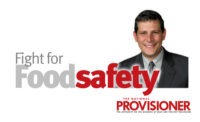Indeed, sometimes really bad things, such as outbreaks and recalls, happen to really good companies. In the unfortunate event your company finds itself in the midst of a foodborne illness outbreak, it is the preparation beforehand — and the calm, reasoned approach during — that will make the difference between simply having a less-than-stellar day or suffering from permanent and lasting damage to your brand.
Effectively dealing with the media is essential not only to maintaining your company’s good reputation, but also to avoiding saying or doing things that could be harmful to the company in future litigation. Companies must do their best to ensure that any statements they make to the media aren’t going to jeopardize arguments made months or even years later in a lawsuit. Plaintiffs’ attorneys can (and most likely will), in future lawsuits, search for, find, spin and then misuse any statements that you or your company make. In this regard, even the absence of a statement can become a liability.
Should you find yourself having to announce a recall, a company spokesperson should be selected as quickly as possible. Keep in mind, however, that this person will not only serve as the face of your company, but he or she will also likely be deposed, and his or her remarks will likely be used at trial. This is one reason it is advisable to have your lawyers intimately involved with the creation of any news releases and also involved in reviewing any responses to media inquiries.
You can also be assured that, when a recall is announced, you will experience a wave media coverage and blog entries relating to the investigation and your company. Your company should consider, long before an outbreak occurs, how it intends to present itself to the media, and thus the public. Because outbreak investigations develop rapidly, and initial findings sometimes prove to be inaccurate after recalls are announced, any company messaging should anticipate this reality. In most circumstances, news releases are useful tools that can allow companies to effectively frame and define their position, while at the same time influencing both consumers and the media.
The moment a recall is announced, it is also important to have an efficient way to process and manage the high volume of claims that will be received. Many of these claims will likely turn out to be meritless, or can be resolved very quickly, so it is important to have a system to resolve the simple claims, and to also identify and begin to effectively triage the more serious claims.
Recalls and outbreaks are rare, but they do happen. If that day ever comes, remember that, while consumers hopefully will quickly forget the involvement of your products, they will never forget the taste of your message.




Report Abusive Comment